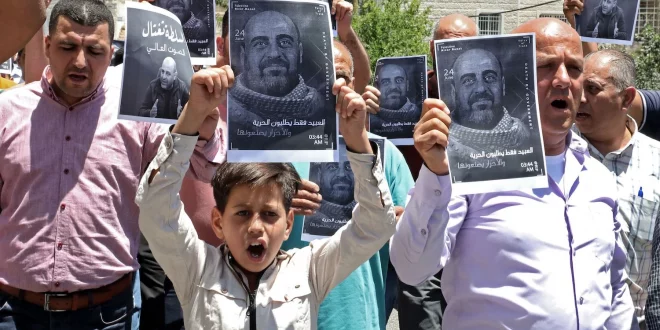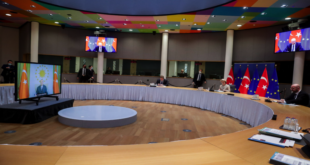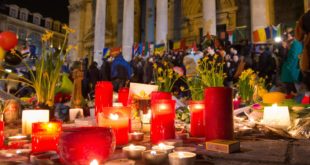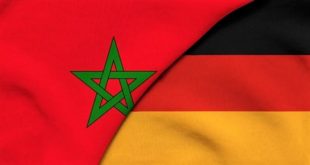Mahmoud Abbas’s unelected and illegitimate government is becoming increasingly violent, but Washington’s largesse is keeping it in power.
At 3:30 a.m. on June 24, Nizar Banat, an outspoken critic of the Palestinian Authority (PA), was arrested at his home in the city of Hebron in the West Bank. According to his family, more than two dozen PA security officers raided the residence and severely beat Banat with metal clubs and rifle butts in front of his wife and young children before taking him into custody. Less than three hours later, he was pronounced dead.
The incident has ignited a firestorm of popular indignation against the PA and its president, Mahmoud Abbas, with large street demonstrations held in Hebron and Ramallah—the seat of the PA—calling for his ouster. Security forces have responded to the protests with further violence but have been unable to quell the mounting discontent with the Abbas-led authority.
The arrest and killing of Banat was not an isolated incident. He had been a persistent target of the PA for his criticism of its leadership’s multitudinous failings, but his death comes amid a wider crackdown on opposition and dissent across the West Bank that began in late April. Days before Banat’s fatal encounter, another prominent human rights activist from Hebron, Issa Amro, had been detained by security officials under the pretext that he had insulted government officials—the type of Orwellian charge common in police states.
The wave of repression appears to be a response to the rapidly eroding support for the PA, for the Fatah party that dominates its institutions, and for the 85-year-old Abbas who sits at its helm. While their collective popularity has been in decline for years, a recent decision by Abbas to cancel a highly anticipated parliamentary election slated for May 22 (the first in 15 years and one in which Banat was running as a candidate)—coupled with widespread perceptions of PA fecklessness in the face of Israel’s forcible expulsion of Palestinian families from their homes in East Jerusalem and the storming of the Al-Aqsa Mosque compound during the holy month of Ramadan—has caused the PA’s public standing to plunge to unprecedented levels.
A recent poll from June showed that only 14 percent of Palestinians supported Fatah’s leadership, an incredible downfall for a faction that has led the Palestinian national movement since the 1960s. (By contrast, the Islamist militant group Hamas’s popularity skyrocketed in the polls after it began firing rockets from Gaza into Israel, supposedly “in defense” of Jerusalem against Israeli aggression.)
Nonetheless, the trend of authoritarianism in the occupied Palestinian territories has been on the rise for years. It is a product not only of a self-serving and corrupt political elite but also of an anti-democratic U.S. policy that acts as a bulwark for Abbas’s autocratic leadership and an Israeli political agenda that has closed the door on Palestinian independence and turned the PA from a proto-state government into a subcontractor of occupation, policing Palestinian population centers and preventing any challenge to Israeli rule. Over time, as the prospects of a Palestinian state recede completely, the PA is becoming increasingly one-dimensional, sapped of its nationalistic mission, and is gradually being folded into Israel’s regime of permanent control over the Palestinians.
The PA last held democratic elections in 2006. At the time, the unexpected victory of Hamas—it won 74 of 132 parliamentary seats—led Israel, the United States, and the European Union to immediately break relations with the PA, putting tremendous pressure on Abbas to overturn the election results. This eventually led to a brief but bloody confrontation that ruptured the Palestinian polity administratively between the Fatah-led PA in the West Bank and Hamas in the Gaza Strip. Since then, a small coterie led by Abbas has managed to monopolize institutional power and decision-making, dissolving the parliament and manipulating the judiciary to serve its interests.
At the same time, the PA’s Western patrons have continued to uphold the institution and to fund and train its security forces despite increasingly authoritarian tendencies and documented human rights abuses. Moreover, in order to prevent Hamas from reentering the PA, those patrons have tacitly discouraged the reunification of the polity and its democratic renewal. Yet viewing Palestinian politics through this binary—either Fatah or Hamas—ignores the wider political landscape in which 30 new party lists had formed and qualified to contest the May 22 election, including younger Palestinians who have been shut out of the political arena for their entire lives.
Consequently, with each passing day, those PA officials still in power drift further from an electoral mandate. And with no progress toward a negotiated end of conflict with Israel and no strategy for liberating Palestinians from Israel’s endless military occupation, their claims to legitimacy no longer have any basis in popular consent. In order to hold on to power, Abbas and his allies have become progressively reliant on political repression, directing the PA’s coercive capabilities not only on members of the rival Hamas camp but against any instance of dissent from the public. In a March poll, 53 percent of Palestinians in the West Bank said they felt they could not criticize the government without fear.
It is impossible to ignore, however, the role that the United States and others play in allowing these undemocratic trends to continue. In the absence of a viable peace process, their ongoing support for the PA is primarily motivated by the desire to maintain stability and ensure Israeli security, without much concern for the cost borne by the Palestinian public in terms of their own human security and basic liberty. Even though the Oslo Accords have broken down and no longer serve the higher purpose of facilitating a peace agreement, PA security coordination with the Israeli military has survived as a condition of the West’s ongoing support. This has created a climate of impunity for the PA in dealing with its own public.
Moreover, PA security coordination works to the sole benefit of Israelis, while average Palestinians face daily attacks from Jewish settlers and the Israeli military, while their fields and orchards are burned, their land usurped for more settlements, and their homes bulldozed—with no one to protect them. Not only is the PA not empowered to safeguard its own public from these attacks, but it has become part and parcel of the effort to suppress them. It is worth noting that Banat’s Hebron residence is in Area C, a territory under Israel’s complete administrative and security control, meaning the PA would have had to get the Israeli military’s permission to enter Banat’s home and that Israel would know the only threat this anti-corruption activist posed was a political one to Abbas—not a security threat to Israel.
This one-sided security paradigm has led many Palestinians to view the PA as a subcontractor of Israeli occupation rather than a conduit to self-governance. The repression of activists like Banat, and ultimately his killing, serves the PA’s narrow interest of keeping opposition at bay and preventing a possible challenge to its current leaders’ hold on power. Yet it also serves Israel’s wider interest by preserving a leadership core on the Palestinian side that is willing to continue playing the subcontractor role, perhaps indefinitely.
That perception has become especially pronounced as the chances of an independent Palestinian state have dwindled and calls within Israel to annex the West Bank have gained momentum. Indeed, Israel’s policies of undermining the possibility of establishing a Palestinian state while consolidating its hold over the West Bank are having a profound effect on the PA, causing it to gradually discard its original mandate of a state-in-waiting to focus only on what ensures its continued existence and external support: acting as an enforcer of the status quo.
Yet without popular legitimacy or a political horizon, the PA might actually be taking this a step further. Just as the leaders of South Africa’s Bantustan governments—small puppet states designated as so-called ethnic homelands for Black South Africans during the apartheid era—had deep security ties with the apartheid regime and helped restrict Black people’s movement and enforce discriminatory policies, the PA has, as the prospects for independent statehood recede, jettisoned its nationalist mission and is effectively becoming an apparatus in the larger administrative structure of an Israeli apartheid state.
It is worth considering that the recent crackdown by the PA almost imperceptibly mirrors Israel’s own wave of arrests against its Palestinian Arab citizens in the wake of the demonstrations that rocked the country in April and May, in which thousands have been detained. At the time, an Israeli police spokesperson described the campaign of arrests as an operation to “restore deterrence,” a peculiar framing when describing the relationship of a state to its own citizens. Similarly, the PA arrests are designed to intimidate activists and deter criticism and unrest from within.
As such, the killing of Banat should be viewed as part of the PA leadership’s ruthless effort to crush dissent and hold on to power, with the U.S. government and Israel complicit by funding, training, and coordinating with the PA to serve U.S. and Israeli interests. Unless those dynamics change, the authoritarianism of the PA is only likely to deepen at the expense of the Palestinian people.
But it is the rise of Israel’s singular regime of ethnic domination, and the role of the PA within it, that poses an even greater threat to the security and basic rights of the Palestinians living under its control.
_____________________________________________________
(*) This article was originally published on Foreign Policy Magazine. Read the original article. The views expressed in this article belong to the author and do not necessarily represent ForMENA
 ForMENA Council for MENA affairs
ForMENA Council for MENA affairs



